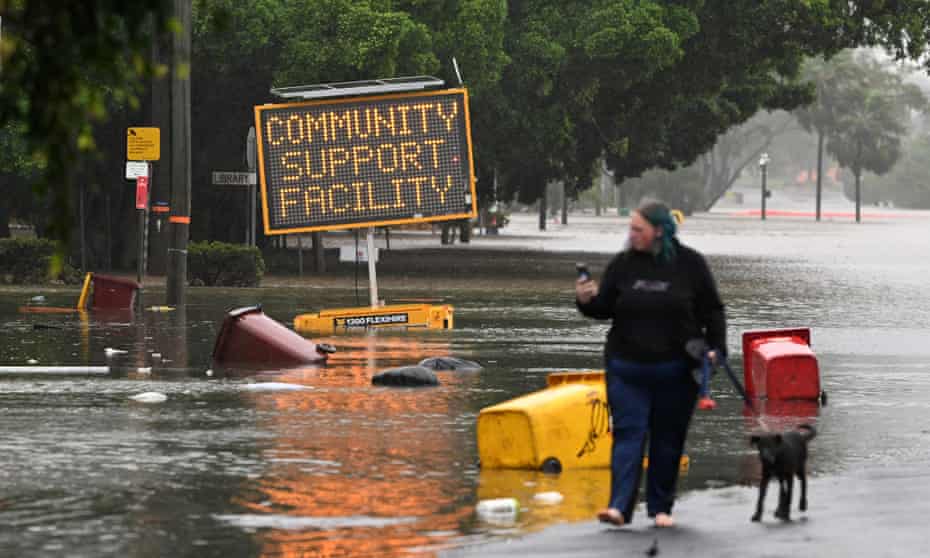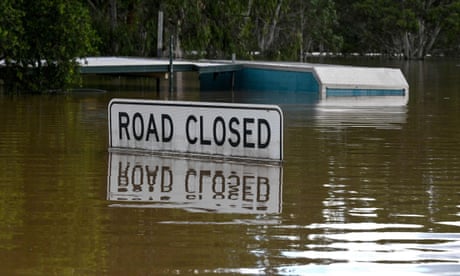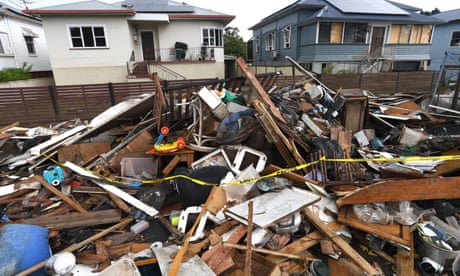Extract from The Guardian
Treasurer’s 2022 budget sees our government sleepwalking into more climate disasters

This week the people of Lismore are again evacuating what’s left of their already flood-wrecked houses, as their levee was breached by flood waters and the rain continued to come down.
Make no mistake, this disaster is fuelled by global warming which in turn is driven by carbon dioxide emissions from gas oil and coal, fossil fuels which are supported in the Morrison government budget.
Along with other communities on the northern New South Wales coast, they face an extremely uncertain future with no insurance and no idea how they are expected to rebuild – or indeed relocate – their communities.
Josh Frydenberg’s budget has an increased disaster resilience fund that he’s promised to raid more often in the face of these events, but without action to address the root cause of these escalating climate disasters this is just a palliative.

The cash the government has come up with in the budget is for past floods but ignores the likely costs of future storm surges, rising sea levels, and beach erosion along the eastern coasts. Also, more floods and bushfires are likely to occur as the climate continues to warm in the face of inaction from the likes of Frydenberg’s government.
While he’s promised more cash for marine science programs that will continue to confirm the Great Barrier Reef is under threat and will suffer increased bleaching events as the world warms, he is again turning a blind eye to the root cause of the problem – the climate crisis and fossil fuel emissions, which this budget promotes.
His government has lobbied against classifying the reef as being in danger from the heating climate. Yet as we speak another catastrophic bleaching event is overtaking this global icon, the great barrier reef. There is nothing in the budget that would address and arrest the threats to this reef and instead its different elements will support the growth in greenhouse gas emissions.
Meanwhile, Frydenberg’s fossil fuel-fired federal ambulance at the bottom of the climate cliff will continue funding a gas-led future, pouring $50m into new infrastructure across seven different gas projects. We already know that Woodside’s Scarborough extension will add just under 1.4bn tonnes of greenhouse gases into the atmosphere, equivalent to 27 years of Australia’s coal power generation emissions at 2018-19 levels.

The government, if re-elected is also set to cut climate spending by 35% over the next five years for its key climate change agencies – the Clean Energy Finance Corporation (CEFC) and the Australian Renewable Energy (Arena) – both of which are tasked with investing in renewable or low emissions technologies.
Luckily, it failed this week to force Arena to start paying for unproven and hugely expensive carbon capture and storage ventures, which have spectacularly failed.
Instead, the government is investing just under $250m over five years to support private sector investment in low-emissions technologies including hydrogen. But creating the hydrogen to use as a fuel source produces emissions, and while projects are being proposed and at various stages, it’s still unclear how long it’ll take to reach the scale needed for it to be a viable alternative to fossil fuels.
Out there in the real world, outside of the Morrison gas bubble, the big money and smart interest is going for green hydrogen at massive scale. Despite all the bluster from Angus Taylor and other Morrison ministers about the Russian invasion of Ukraine spurring a move to gas for energy security reasons, the reality is otherwise.
Meanwhile, over in Berlin, Andrew Forrest strikes a $50bn investment in green hydrogen with German energy giant E.ON. Essentially, the government has left investment, particularly in innovation and supply chain productivity, almost entirely up to the private sector.
This is a budget of missed opportunity.
Where are the measures to encourage the production and uptake of electric vehicles?
While states are rushing to encourage the uptake of EV’s and set up charging networks, the federal government is MIA, with the country’s industry body, the Electric Vehicle Council, this week pointing out the market is so skewed that second hand Teslas are costing more than brand new ones.
Yet the government, unlike so many of its global counterparts, still hasn’t put an end date to the sale of combustion vehicles, nor introduced fuel efficiency standards. It hasn’t lifted a finger to help this obvious new technological step that would cut emissions and reduce our reliance on oil. Cutting the fuel excise tax this year is a last-resort measure, when getting the transport sector off oil would build resilience and help the climate.
And this week the UN’s science body is finalising its report on what countries need to do to tackle climate change. While this has yet to be released, it’s clear that the top priority will be a 100% electrified energy system that doesn’t include fossil fuels, and that areas like transport and buildings
Earlier this month the UN secretary general António Guterres singled out Australia as being a G20 laggard on climate change action, which it is. While other countries increased their 2030 targets, Australia has not, and it is nowhere near the Paris Agreement’s 1.5˚C warming limit.
The Morrison government has failed to act on this and many other warnings.
This budget digs Australia climate policy hole deeper, fuels increases of greenhouse gas emissions which will drive more climate catastrophe, and fundamentally misses the turn to green solutions which would provide a much brighter economic future for the country and its regions.
Bill Hare, a physicist and climate scientist, is the chief executive of Climate Analytics
No comments:
Post a Comment